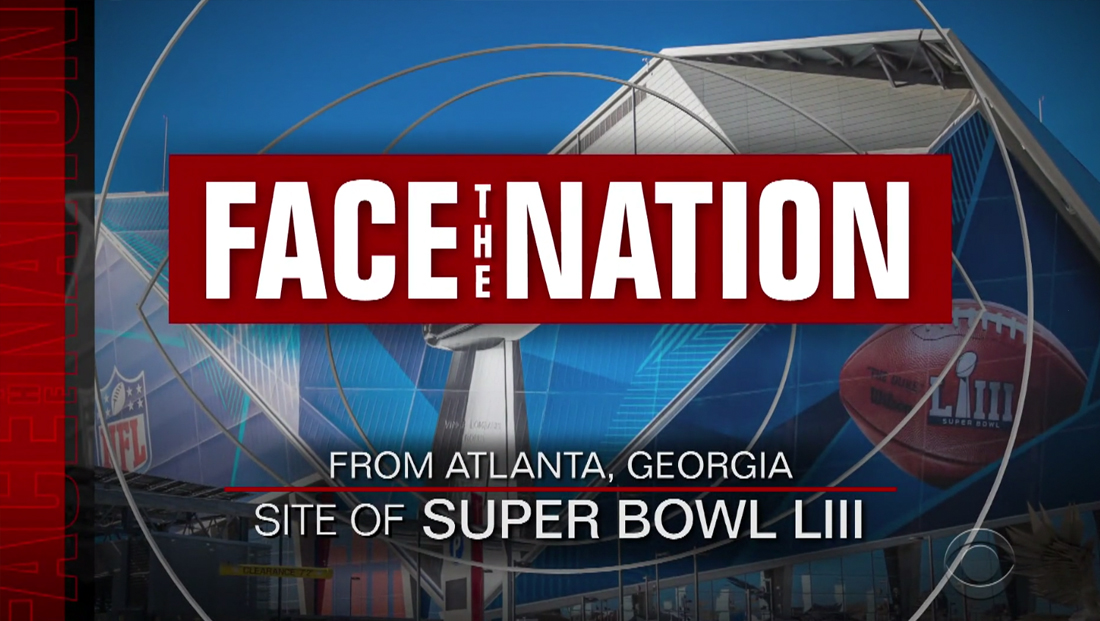CBS revises ‘Face the Nation’ interview policy after DHS complains of ‘deceptively’ edited segment

Weekly insights on the technology, production and business decisions shaping media and broadcast. Free to access. Independent coverage. Unsubscribe anytime.
CBS News has updated its interview policy for “Face the Nation” after pressure from the Trump administration and right-leaning media accused the network of “selectively” editing an interview with the Department of Homeland Security’s Kristi Noem.
The interview in question originally aired Aug. 31, 2025, and was conducted by Ed O’Keefe, who was filling in for moderator Margaret Brennan.
After the interview aired, the Department of Homeland Security issued a statement pointing out that CBS edited out 23% of the interview.
“This morning, I joined CBS to report the facts about Kilmar Abrego Garcia,” said Noem in the statement. “Instead, CBS shamefully edited the interview to whitewash the truth about this MS-13 gang member and the threat he poses to American public safety.”
Kilmar Abrego Garcia, who prefers to be known as Kilmar Abrego, has been the center of controversy about his immigration status and allegations of violence and other criminal activity while in the U.S., though the exact specifics have been extensively fact-checked.
Abrego’s status with any gang affiliation is unclear. In a 2019 case, two judges did rule that there was sufficient evidence to support Abrego’s alleged gang membership, though his legal team says those links stem from “well-founded” fear of persecution by Barrio-18, a rival to M-13. Other evidence provided by the Trump administration over Garcia’s alleged gang links has been questioned by experts.
Noem also brought up allegations of domestic abuse against Abrego’s wife documented in statements she made to courts, though she ultimately opted to work on resolving their marital problems privately.
Noem also made references to allegations of possessing child sex abuse materials. Abrego is not facing any charges in relation to those allegations; however, the Department of Justice has said it has unspecified evidence, provided by “co-conspirators,” of the allegations.
DHS has also accused Abrego of human trafficking, citing a 2022 incident where he was pulled over by police. Officials allege there were eight people in the vehicle with him at the time, which led the officer to suspect human trafficking. However, no charges related to those accusations were filed against Abrego and his attorney noted that it’s not uncommon for day construction workers such as Abrego to transport other workers to job sites.
DHS notes the following parts of the interview were edited out, which are being presented here unedited for full transparency. Many of the allegations Noem makes are either unfounded, inaccurate or misleading.
- “This individual was a known human smuggler, MS-13 gang member, an individual who was a wife beater, and someone who was um so perverted that he solicited nude photos from minors. And even his fellow human traffickers told him to knock it off. He was so sick in what he was doing and how he was treating small children. So, uh, he needs to never be in the United States of America and our administration is making sure we’re doing all that we can to bring him to justice.”
- “…And many of these individuals were people who have, you know, conducted horrific um horrific activities against American citizens, trafficking of children and pedophiles. And so that’s uh one of the things that the people of a LA can be grateful for is that they don’t have those bad actors, those people on their streets anymore because of the work of President Trump and his administration.”
- “…You know, in Washington, D.C., I rarely run into anybody who says, ‘I’m a lobbyist for the American taxpayer.’ Well, guess what, Kristi Noem is. Every day I get up and I think the American people are paying for this. Should they? And are these dollars doing what the law says they should be doing? I’m going to make sure that they go there and they’re spent what’s appropriate according to the law and that the taxpayers understand that it’s a worthwhile effort.”
- “…And my hope is that every single person within the Department of Homeland Security, but also in this government gets up every day wanting to make America safer, wanting to do their job and to contribute to that in a very productive way.”
DHS also notes that the network cut out an entire question and response about DHS hiring standards.
“All right. So, Immigration and Customs Enforcement is aiming to hire another 10,000 officers by the end of this year,” said O’Keefe. “Nearly double the size of the current force. Basic training is being reduced from 13 weeks to 8 weeks in an attempt to accelerate the hiring and the onboarding of these officers. Uh there’s signing bonuses. Some age caps have been lifted. Did the hiring standards get lowered in part to meet this daily quota of 3,000 arrests?”
“Oh, what we’ve done as far as recruitment, and again, Ed, we’ve got over 130,000 people that have applied to be a part of that 10,000 new hires within ICE,” responded Noem. “Bt we did not reduce any of the qualifications or time frames. What we did was that we made sure that we were being much more efficient in getting these officers out on the street and giving them more opportunity to get trained uh quickly and recognize the previous training that they had. if they were a previous law enforcement officer or someone that wanted to come back out of retirement, we facilitated that where before the federal government had ignored those individuals or put them through classes that they had already qualified for or become masters at. So, I think that streamlining is what needed to happen. And we’re so grateful that so many other retired law enforcement officers or those from different areas of the country say, “Listen, I want to be a part of what ICE is doing because these individuals are out there making sure that they’re going after dangerous criminals and bringing them to justice and making sure that if they’re here in this country and they’ve perpetuated these crimes and violence that they have the opportunity to go home to their own home country and place consequences there as well.”
CBS also cut out what DHS labeled a “minor transition” from O’Keefe: “Well, you anticipated some of the questions we asked of him. So, as we say in this business, stay tuned for that. But we’ll uh let’s let’s ask you a few more while we have you.”
In response to DHS’s claims, CBS initially said that it edited the interview for time and met its standards. The network also noted it posted the entire, unedited interview to YouTube and provided a full, un-edited transcript, before the controversy started.
Later in the week, CBS announced an updated policy in response to “audience feedback” aimed at being more transparent with its interviews.
For “Face the Nation,” the network said it will only carry live or live-to-tape interviews without edits, unless they are needed for national security or legal reasons.
“This extra measure means the television audience will see the full, unedited interview on CBS and we will continue our practice of posting full transcripts and the unedited video online,” CBS said in a statement.
It’s common practice for networks to edit interviews for time, though programs such as “Face the Nation,” which are often designed around more in-depth interviews and roundtables, do often have the flexibility to include longer responses.
CBS did not announce any changes in policy for its other broadcasts, such as “CBS Evening News” and “CBS Mornings,” though both of those broadcasts are often subject to tighter time limits to keep up pacing. “60 Minutes,” which often has more airtime to devote to interviews, also was not mentioned in the announcement.
Based on the content of the material CBS edited out, it’s possible the network opted to remove statements that appear to be largely inflammatory, inaccurate and even contain criminal allegations without little or no reliable evidence.
While CBS did not comment on the accuracy of Noem’s statements or decision made in relation to them, it’s possible the network opted to remove these responses for fear of legal action being taken against it.
CBS could claim that it was simply airing Noem’s statements and that they do not reflect its views or even represent an accurate depiction of events, though it’s not clear if that could totally absolve it of any legal action by Abrego or others.
It’s also not clear how CBS would handle if a future interview includes similar statements. One workaround would be on-air fact-checking, though it’s possible that would draw ire from the Trump administration as well.
Although CBS did not comment further on its caveat of editing interviews for legal reasons further interviews with allegations that lack legal basis could still be removed, at least under a general interpretation of CBS’s new policy.
Leaving the door open for edits to remove sensitive information uttered by guests is also a common practice among broadcasters in the relatively rare event that a guest slips up and reveals information that is classified or confidential. Most networks work with federal officials to resolve such issues and remove them before air.
By including the exception for live to tape interviews, CBS also appears to be ensuring it can still use the long time practice of taping interviews with key lawmakers ahead of time in order to accomodate these guests needing to appear on multiple Sunday morning public affairs program.




tags
CBS News, Ed O’Keefe, Face the Nation
categories
Broadcast Industry News, Network Sunday Public Affairs Shows